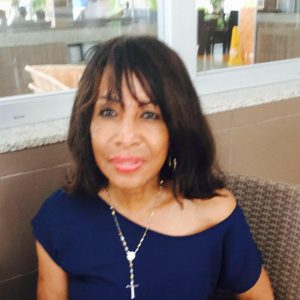
Heyman is a well-known expert on intergenerational social work—something that she gets to practice in her own home, especially now. While granting a phone interview with Fordham News, she sat at a table cutting shapes out of paper with her grandchildren while her mother-in-law futilely tried to disengage a face-to-face video chat.
“My mother-in-law, who’s 94, tried to connect with us, but now she can’t figure out how to turn it off,” she said with a laugh. “I’m sitting here with three generations trying to help while making triangles and rectangles.”
Heyman noted that the phone situation with her mother-in-law, while amusing, is also a graphic example of the challenges sequestered older adults face during the COVID-19 restrictions. While much of America engages on social media and in video chats, many older adults do not know how to use the technology. Most are not just being cut off from the population at large, but from their family and friends as well.
“We talk about all our students and everybody going online, but for many older adults, they’re not online or able to connect,” said Heyman.
She said that some social workers who are used to seeing their clients at the senior centers for lunch and social activities are reaching out to them with phone calls to check in on their mental and physical health.

Social worker Colette Phipps spearheads one such effort in Westchester. After 10 years as an adjunct lecturer teaching human rights and social justice courses in the Graduate School of Social Service (GSS) at Fordham’s Westchester campus, Phipps was teaching “Social Work Practice with Communities and Organizations” this semester when the pandemic broke out in her near her home in New Rochelle. She also works with seniors through Westchester’s TIPS program (the Telehealth Intervention Programs for Seniors), part of Westchester County Livable Communities/Age-Friendly Initiative, of which she is the executive director. She said the closing of community programs has been tragic for seniors.
“I was talking to a site director last week who said to me, one of the seniors came in when they knew that the site was going to close and said, ‘Oh, you don’t have to worry about feeding me a hot meal. I’ll just bring a whole sandwich. I just want to be here,’” recalled Phipps.
Up until the pandemic, the TIPS program sent trained student technicians, often GSS students, to take seniors’ vitals at community centers, nutrition sites, housing authorities, and independent living facilities for seniors. Referred to as social support associates, the students were trained to transmit the health care data to telehealth nurses who review it remotely, saving the county money by reducing unnecessary hospital and doctor visits. The program also familiarized seniors with county services and doctor referrals when necessary.
Phipps said the seniors adored the students and would happily go to get the routine procedure done in order to interact with the young people. With physical encounters halted, Phipps organized TIPS in Touch two weeks ago. The intergenerational program allows the same students to call and check in on the seniors, who now long to hear a familiar voice.
“Can you imagine when Daria calls and says, ‘Hi Ms. Jones, it’s me, Daria. How you doing?’ They’re gonna be thrilled!” Phipps said while planning the new intervention.
She said that while the students can no longer gather the vital signs data, they can get other important information by asking a series of questions.
“The trusty old phone is old school, but it works,” said Phipps.
As students began making the calls from their homes over the past week and a half, Phipps deemed the program a success. She said they ask key questions, including: Have you fallen? Have your medications changed? Are you taking them on time? How are you feeling? If the social worker determines there is a problem they will connect the senior with any number of services available to them within the county, from food delivery to emergency care.
Both Phipps and Heyman said there are lessons that all caregivers and families can take away from the skills social workers use in reaching out to their clients by phone. Here are a few tips:
Call!
Phipps: “I think more than anything, we can simply talk to a person who is home alone because they feel so socially isolated.”
Be Kind
Phipps: “Let them know you miss them. You can say ‘Mary, I really miss you. I can’t wait to see you again. But this is what we’re going to do to keep as connected as possible.'”
Be Real
Phipps: “Acknowledge the obvious and simply say, ‘This really something. It’s really changed our lives around.’ You don’t want to talk with the older adult like you are above them or that you’re not experiencing some of the same things they’re experiencing.”
Be Blunt
Phipps: “You want to have a lilt to your voice, but you don’t want to invalidate how they’re feeling or how you’re feeling. It’s OK to say, ‘This really sucks!'”
Be Practical
Heyman: “Talk about any type of daily activities. Make sure they’re not having any further impairments, that they’re getting their nutrition, their meals. If not, in New York City there’s a lot of services through 3-1-1, and in Westchester, 2-1-1 is providing a lot of outreach as well.”
Listen
Phipps: “I can sort of tell just by the tone of voice, even though I can’t see the face, what kind of affect they have. I can tell if they are down. I like to be very careful about talking about being depressed. It is something many older adults are not interested in revealing. You might say, ‘Wow, your voice is not the same today, Agnes. What’s going on?’ Then listen to what they have to say.”
Finally, Heyman advised caretakers and social workers to care for themselves.
“When they’re on the frontline, they really need to take a deep breath and realize they’re doing the hero work just like our physicians, our nurses, and our caregivers,” said Heyman. “Day in and day out, they’re the ones really making the difference in the lives of the individuals and their families.”
Phipps also stressed self-care.
“You’ve got to take a little time off. You really do. You have to have some time for yourself because the stories that you hear are very much heartbreaking,” said Phipps. “You have to refresh. It may be that you just sit down and meditate for a bit or do a little exercise or read a book. You know, I tell my students that we are like Sisyphus pushing that rock up the hill, but we have to find joy in doing it.”
]]> The Fordham Tick Index is an estimate of the risk of being bitten by a nymphal or adult deer tick. Both of these stages are active at this time of year, although the smaller nymph is responsible for many more cases of Lyme disease. This index measures risk relative to other times of year. For more information about preventing tick bites, controlling ticks, Lyme disease and other illnesses ticks carry, visit the Centers for Disease Control and Prevention website.
The Fordham Tick Index is an estimate of the risk of being bitten by a nymphal or adult deer tick. Both of these stages are active at this time of year, although the smaller nymph is responsible for many more cases of Lyme disease. This index measures risk relative to other times of year. For more information about preventing tick bites, controlling ticks, Lyme disease and other illnesses ticks carry, visit the Centers for Disease Control and Prevention website.
The Fordham Tick Index is provided as a weekly public service by Fordham University and is based on both current and historical data from one site in Westchester County, N.Y. It is an estimate only. Actual risk may vary geographically. Therefore, always take precautions to prevent tick bites when outdoors.
01 = Low risk.
Enjoy the outdoors, but take precautions.
05 = Moderate risk.
Ticks are fairly abundant. Use caution.
10 = High risk.
Limit exposure and use extreme caution. If you’re thinking of taking a hike, consider going to a movie instead.
TICK FACT OF THE WEEKIxodes ovatus, an Asian species of tick not known to be especially important in transmitting disease agents to people, has been found with Borrelia garinii, one of the bacteria that cause a form of Lyme disease. This tick may be growing in importance as a vector in Asia. For background on the Tick Index, see:
“What We Talk About When We Talk About Ticks”
For further information, contact Thomas Daniels
Copyright © 2006 Fordham University Calder Center.
All information contained on this site is the property of Fordham University and is protected by United States and international copyright laws. The compilation of all content on this site is the exclusive property of Fordham University. You may reproduce, distribute or republish information contained on this site (either directly or by linking)by crediting the Fordham UniversityPollenStation.You may not alter or remove any trademark, copyright or other notice from copies of content.